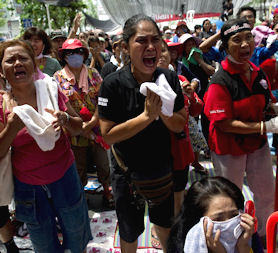Thailand: tensions remain despite protest end
Updated on 19 May 2010
As a final military push quells protests on the streets of Bangkok Rosheen Kabraji of Chatham House writes that the government must act in order to address fundamental fractures in Thai society.

The intense clashes between the military and protestors that have turned the centre of Bangkok into a battlefield appears to have come to a temporary lull.
The military went in for the 'final push' to clear the protestors out of their camps and it became clear to senior red shirt leaders that a massacre would likely take place unless they surrendered themselves to the authorities.
The situation, however, remains tense and fluid.
For now the protestors are being systematically forced out of their camps, out of the centre of the city and their leaders have been arrested.
But it would be premature for the government to declare any kind of victory: the majority of the red shirt protestors who have been told to go home by their leaders do not see this conflict as being over. Their leaders have encouraged them to continue their fight for political change even after their demands for a democratically elected government were met with fierce force.
It is as yet unclear what course of action the anti-government protestors will take next; this temporary pause could be a tactic to provide them with time to regroup, but it is likely that sporadic clashes in Bangkok will continue.
External intervention, possibly by the UN, would have offered a chance of the current stand off being solved by peaceful means. But the government has already rejected their offers thereby limiting the options for this to be resolved peacefully. If the military stepped in this would provide further ammunition to the hard line red shirts and potentially drive the wave of violence to other parts of the country.
If the Thai monarch, King Bhumibhol Adulyadej, were to intervene (the King is ill in hospital and has thus far remained silent), that could possibly calm the situation, as it has done in the past.
Although the Thai government may be regaining control of the areas the protestors have occupied, there are reports that pockets of resistance are cropping up in other parts of Bangkok and that the violence is spreading to cities in the north-eastern provinces, the rural heartland of the red-shirt protestors that are largely sympathetic to the exiled ex-prime minister Thaksin Shinawatra who also has a strong support base in the region.
The current curfew order for Bangkok and nearby cities and the imposition of emergency law in the provinces of the North and Northeast is clearly an attempt by the government to keep the violence from spreading elsewhere.
But as the violence in Bangkok has not yet dissipated the frustration felt by the residents of the city will also come to the foreground as the impact of this conflict on the economy and infrastructure is assessed.
Thailand's tourism sector and economy has been hit hard, but in the long term it is unlikely the image of the country as a tourist destination will be irreversibly damaged.
If the situation calms down for a few weeks, the already weakened coalition government of Prime Minister Abhisit will need to quickly demonstrate they have a clear course of action, including a plan for early elections in November, in order to get the two sides back to the negotiating table. However, the decision to use force may have limited the Thai authorities’ negotiating options.
Without genuinely addressing the fundamental fractures in Thai society that have exacerbated the divide between the rural poor and urban rich, instability in Thailand will continue.
Rosheen Kabraji is from the Asia Programme, Chatham House.



